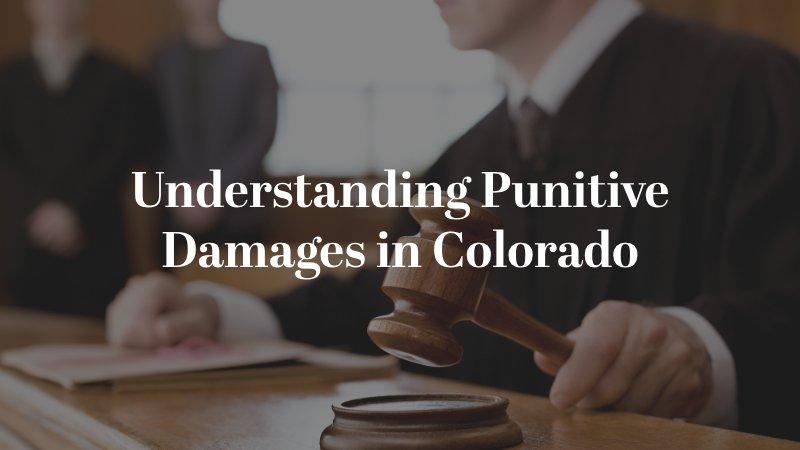To understand punitive damages in Colorado, you must first understand damages awards in personal injury cases. Generally, there are two categories of damages available to victims of personal injuries.
These are compensatory damages and exemplary or punitive damages. This article discusses compensatory and punitive damages, drawing distinctions between the two.
If you suffered injuries through no fault of your own and would like information about damages, contact an experienced Denver personal injury attorney for a claim assessment.

Compensatory Damages in Colorado
Most damages awards in Colorado are compensatory damages. A compensatory damages award may include payment for the following and more:
- Medical bills;
- Mental health counseling;
- Occupational therapy;
- Lost wages;
- Lost earning potential;
- Physical pain; and
- Mental suffering.
Compensatory damages are damages meant to make a personal injury victim “whole” again or to bring them as close to their pre-accident state as possible.
Punitive or Exemplary Damages in Colorado
Punitive damages in Colorado are meant to punish a defendant for outrageous conduct. These damages are not a means to compensate an injury victim but to discourage others from the same or similar conduct in the future.
Punitive damages are appropriate in cases of:
- Fraud or false misrepresentation of an important fact to deprive the victim of a legal right;
- Malice or evil intent or desire; and
- Willful and wanton conduct or acting with reckless disregard for the health and safety of others.
Punitive damages may be awarded in addition to compensatory damages at trial. In Colorado, a personal injury victim and their attorney may not request punitive damages at the start of a lawsuit.
Instead, the court decides if there is enough evidence to instruct the jury regarding an exemplary damages award at the end of the trial.
Colorado Limits Punitive Damages Awards
Colorado limits punitive damages awards. Typically, a punitive damages award is “capped” or may not exceed the amount of a victim’s compensatory damages award.
There is an exception to this rule. If a defendant has continued to act willfully or wantonly against the victim or others or has acted in a way that has aggravated the victim’s injuries, the punitive damages award may be up to 300% of the compensatory damages award.
The court has the authority to reduce the amount of punitive damages awarded by the jury if:
- The deterrent effect of the damages has been accomplished; or
- The conduct that resulted in the award has ceased; or
- The purpose of such damages has otherwise been served.
The court and jury may consider any case variables when determining a punitive damages award, except a defendant’s income and net worth.
Discuss Your Case with an Experienced Denver Personal Injury Attorney Today
If you would like to discuss the possibility of punitive damages in your personal injury case, call the experienced Denver attorneys at Dulin McQuinn Young today. We are a successful personal injury firm built by trial lawyers and dedicated to our clients.
With over 20 years of experience, Dulin McQuinn Young can help you get maximum value for your injuries. You can schedule your complimentary consultation with Dulin McQuinn Young in Denver at (303) 246-1111.
Your consultation is risk-free, and at Dulin McQuinn Young, we only get paid when we win compensation for you!